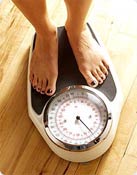Manage your Weight like you Manage your Money
Weight management is like money management. Just like your bank balance cannot be a constant your weight too cannot be a constant. The reason is that money has to be spent daily for various needs, similarly food has to be eaten daily. There may be emergencies like an accident or health problem where you may have to spend a large amount of money and there will be a change in your bank balance, similarly you may go through an illness or accident where your eating habits, lifestyle or exercise schedule may change and this may result in a weight change.
 |
A big question that arises is that do we try the same diet we have used earlier and will the same exercise that has worked before work again. Of course the formula can and must be tried again but what has to be kept in mind is the age factor. With every 3-5years of advancing in age your metabolism or the speed at which your heart and internal organs tick, slows down. The second factor to check is whether any disease condition such as hypertension, heart disease, diabetes or thyroid problem has developed. Finally menopause results in a tremendous slowing down of your system by which you may find yourself gaining weight rapidly and unable to lose weight easily.
A person who lost 20kgs in her/his thirties may struggle to lose 5kgs post 40 years of age. We have observed that most women are finding it very hard to shed weight post 40 and therefore our advice is that those who have had their babies and done with this in their early thirties must immediately shed weight and maintain it strictly thereafter as after 40 it is very difficult to lose weight. Men struggle the most in their late 40ís and 50ís and if they allow their bellies to spread in their 40ís they develop serious back and knee problems thereafter and get trapped in a vicious cycle as they cannot exercise if their backs and knees hurt and the weight only goes higher.
Prevention is better than cure. As we all regularly update our pass books and check our bank balances we must check our weight once a week. Same day, same time, preferably in the morning on an empty stomach. If you see the weight up by one kilo, be strict with your diet and exercise for 1-2 weeks and take off the weight immediately. If you ignore that one kilo and let it go up by 2-3kgs then you have to diet for a whole month and this could be very difficult and you neglect it and before you know it you will be 5-10kgs or more than you were earlier.
Now to plan your diet regimen and exercise schedule the most important rule to keep in mind is that we want to raise your metabolism, not let it go further down. Please note that if you try to make money fast, by some short cut method, you only end up in big trouble. Similarly donít try shortcut and quick fix diets, they only do more harm than good .They ultimately lower your metabolism and health.
You need to eat all three meals and all three meals must contain carbohydrate and protein foods. To be very strict we have seen that if you completely avoid rice, rice items, rice flakes and puffed rice as well as refined cereals like sooji, pasta, noodles and white bread you lose weight more easily. Whole Wheat rotis, whole wheat bread, cornflakes, oats, ragi, bajra, etc., are good cereals to use.
Protein in the form of skimmed milk, egg whites, dhal, sambar and pulses must be included in every meal. Fish or chicken if eaten must be eaten only at lunch. Plenty of raw salad must be eaten both at lunch and dinner to raise metabolism and whole fruits must be eaten with their fiber instead of drinking juices.
Exercise must include a cardio session of 30-40 minutesí walk all 7 days. Other forms of exercise may be included 3-4 times a week but walking has to be all 7 days as we are eating all 7 days.
Last but not the least 2-3 liters water also helps to keep your metabolism up as it keeps you fresh and more active. |